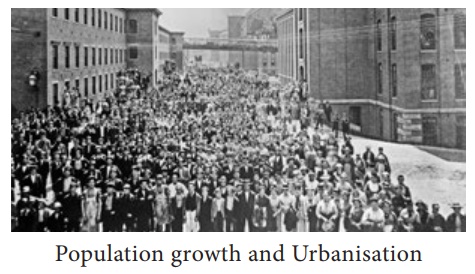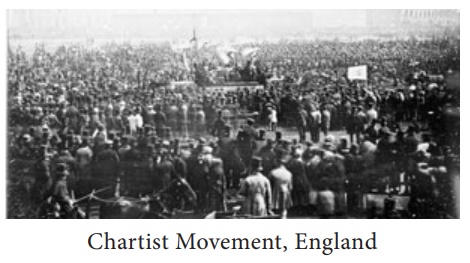Chapter: 9th Social Science : History: Industrial Revolution
Effects of Industrial Revolution in England
Effects of Industrial
Revolution in England
Industrial Revolution led to the expansion of trade, the production
of more food, emergence of factory workers as a new class. The rise and growth
of cities resulting in rapid urbanisation and organised working- class
movements, seeking voting rights and regulation of their service conditions,
brought about a new dynamics in politics.
Impact on Environment and Living Conditions
The use of chemicals and fossil fuels that replaced wind, water
and firewood resulted in increased air and water pollution. The Industrial
Revolution marked a major turning point in earth’s ecology and humans’
relationship with the environment.
The Industrial Revolution helped create opportunities for
employment for all members of the family. However, the life for the labouring
class was miserable. Children were employed in textile mills because they
worked for lower wages. In 1842, the British Parliament published a report
about the state of coal mining – the Mines Report – and the report informed the
public that children under five years of age worked underground as trappers for
12 hours a day and for a daily wage of 2 pennies; older girls carried baskets
of coal which caused deformities.
Safety was very poor in early industrial factories and mines. The
injuries from machinery would vary from mild burns, arm and leg injuries, to
whole fingers to be cut off, or amputation of limbs and even death.
The housing was tiny, dirty, and sickly for the labouring class.
Workers had no time to clean or change their own atmosphere even if they wished
to, leading to the outbreak of typhoid, cholera, and smallpox.
With no legislation to monitor the service conditions workers had
few rights. Working conditions were harsh with no weekly holidays or leave for
sickness. With low wages the entire family had to work in factories.
Urbanisation
With the advent of the Industrial Revolution, England became the
workshop of the world. There was however a general decline in agriculture. This
resulted in the flow of population from villages to industrial towns.
Population growth, migration and urbanisation were the major social changes
taking place during this period. In pre- industrial society, over 80% of people
lived in rural areas. As the migration from the countryside began to intensify,
small towns became large cities. The city of London grew from a population of
two million in 1840 to five million in forty years.
Manchester’s cool climate was ideal for textile production.
Further it was situated close to the port of Liverpool and the coalfields of
Lancashire. Manchester became the textile capital of the world, drawing huge
numbers of migrants to the city. In 1771, Manchester was a sleepy town of
22,000 people. Over the next fifty years, its population exploded and reached
180,000.![]()

Socio-economic Consequences
While the peasants were pauperized and the working class suffered, the middle class became wealthy by investing capital in trade and industry. The governments of the day were influenced by them. All legislations safeguarded their interests. Labourers were not permitted to form trade unions. It was under these circumstances that Socialism as a new ideology was born in Europe. Karl Marx advocated scientific socialism for the protection of the working class from the exploitative policies of the capitalist class. By the latter half of the nineteenth century there were strong working class movements all over western Europe which demanded economic as well as political rights.
Labour Movement
Combination Laws of 1799 prohibited the formation of associations
of workers. In the early decades of the nineteenth century there were Luddites.
Fearing the loss of jobs due to the introduction of machines, Luddites
protested by wrecking machines. The Combination Laws were repealed in 1824. Yet
the workers could not form a national union. The Reform Bill of 1832 granted
voting rights only to the propertied middle class. Frustrated by this, the
working class in a large gathering prepared a charter of demands and obtained
signatures from millions of fellow workers. The charter was presented to
the House of Commons (the English Lower house in the Parliament, England). Known as
Chartism, this working class movement was active between 1836 and 1848. The
Chartists called for voting rights to every man over twenty-one years of age,
secret ballot (voting), abolition of property qualification for members of the
parliament, annual parliamentary elections and equal representation.

Related Topics